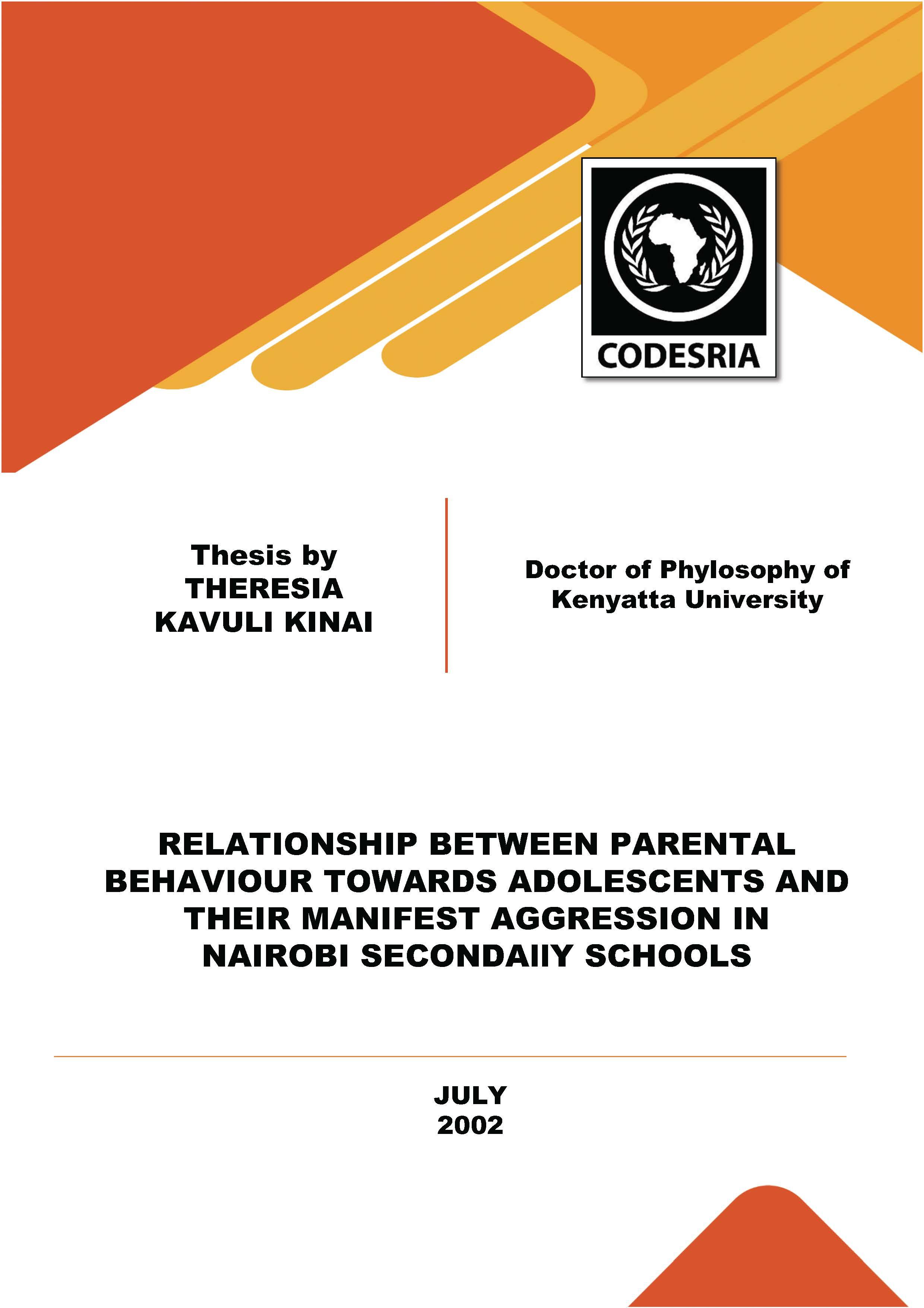Relationship between Parental Behaviour Towards Adolescents and their Manifest Aggression in Nairobi Secondary Schools
Keywords:
Social behaviour, parents, adolescents, aggression, secondary schools, parental behaviour, parent-adolescent relationships, family interactions, KenyaSynopsis
The objective of this study was to investigate the influence of parental behaviour on adolescent manifest aggression in Nairobi Secondary Schools. lt examined whether adolescent aggression was related to: parents' emotional interactions with adolescents, parental supervision, parental methods : of controlling and disciplining adolescents, consistency of parents in enforcing discipline, family interactions and parents' socio-economic status. The study explored whether there were sex differences in manifest aggression of adolescents. The study sample consisted of 672 secondary school students (336 boys and 336 girls) from 6 schools stratified and randomly selected from Nairobi Province. The Chi-square test of significance at the p < 0.05 level was used to test the hypotheses. The findings of the study showed that: adolescents whose parents were harsh were significantly more aggressive than th~ adolescents whose parents were loving. Adolescents whose parents were neglecting and rejecting were significantly more aggressive than those adolescents whose parents monitored their movements, activities and social contacts. Adolescents whose parents . ùsed punishment and threats were significantly more aggressive than those adolescents whose parents used inductive reasoning and reinforcement. Adolescents whose parents enforced discipline inconsistently were significantly more aggressive than those adolescents whose parents enforced discipline consistently. Adolescents who experienced tension and conflicts in their families were significantly more aggressive than those from harmonious homes. There were significant sex differences in manifest aggression of adolescents. Boys were found to be more aggressive than girls. Parents' socio-economic status did not seem to influence adolescent manifest aggression:
Downloads
References
Ary, D., Jacob, L.C., & Razavic, T., (1990). Introduction to Research in Education (Fourth Edition) Chicago, Forthworth: Holt Rinehart & Winston Inc., pp.19-209.
Ausbel, D.P., Batazar, E.E., Resental, I.,1Blackman, L.S., Spoont, S.Z., & Welkowitx, J., (1954). Perceived parent attitudes as determinants of Children's ego structure. Child Development, 25, pp.173-183.
Awour, E., (1996). Violence against Women. Daily Nation (Newspaper), Tuesday, December, 3, p.4.
Bandura, A (1973). Aggression: A Social Leaming Analysis, Englewood Cliffs, NJ : Prentice Hall.
-----Ross, D., & Ross, S. A (1961). Transition of Aggression through Imitation of Aggressive Models., Jour11a/ C!f Abnorma/ and Social Psychology, 66, pp.3-11. ·
-----(1963). Vicarious Reinforcement and Imitation Leaming. Journal qf Abnorma/_and Socia/_Pshychologique, 67, pp.601-7.
-----& Walters (1959). Adolescent Aggression, New York: Ronald.
Barnet, M.A., (1987). Empathy and Related Responses in Children. In Eisenberg and J. Strayer (Eds.)
Empathy and its Development. Cambridge. England: Cambridge University Press.
Baumrind, D., (1971 ). Authoritarian versus authoritative control. Adolescence 3, pp.255- 275.
-------(1991). Effective Parenting During Early Adolescent Transition. In P.A. Cowan & M. Etherington (Eds.), Family Trm1sitio11s Hillsdale, N.J.: Erlbaum.
Becker, W. C., (1964). Consequences of Different Kinds of Parental Discipline. In M. L. Hoffinan and L. W. Hoffinan (Eds.). Review C!fC'hild Development Research (Vol. 1) New York: Russel Sage Foundation.
Belsky, J., (1981). Early Human Experience: A Family Perspective. Developmental Psychology 17, pp3-23.
Berkmvitz, L., (1960). Repeated Frustrations and Expectations in Hostility Arousal. Journal of Abnormal m1d Social Psychology, 60, pp.422-429.






